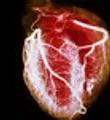Cholesterol Management Health Center
The Basics of Cholesterol
Have you been diagnosed with high cholesterol? Is lowering your cholesterol a goal? The first step is to find out: What is cholesterol?
Cholesterol is a waxy, fat-like substance made in the liver and other cells and found in certain foods, such as food from animals, like dairy products, eggs, and meat.
The body needs some cholesterol in order to function properly. Its cell walls, or membranes, need cholesterol in order to produce hormones, vitamin D, and the bile acids that help to digest fat. But the body needs only a limited amount of cholesterol to meet its needs. When too much is present health problems such as heart disease may develop.
Cholesterol and Heart Disease
When too much cholesterol is present, plaque (a thick, hard deposit) may form in the body's arteries narrowing the space for blood to flow to the heart. Over time, this buildup causes atherosclerosis (hardening of the arteries) which can lead to heart disease.
When not enough oxygen-carrying blood reaches the heart chest pain -- called angina -- can result. If the blood supply to a portion of the heart is completely cut off by total blockage of a coronary artery, the result is a heart attack. This is usually due to a sudden closure from a blood clot forming on top of a previous narrowing.
Types of Cholesterol
Cholesterol travels through the blood attached to a protein -- this cholesterol-protein package is called a lipoprotein. Lipoproteins are classified as high density, low density, or very low density, depending on how much protein there is in relation to fat.
- Low density lipoproteins (LDL): LDL, also called "bad" cholesterol, can cause buildup of plaque on the walls of arteries. The more LDL there is in the blood, the greater the risk of heart disease.
- High density lipoproteins (HDL): HDL, also called "good" cholesterol, helps the body get rid of bad cholesterol in the blood. The higher the level of HDL cholesterol, the better. If your levels of HDL are low, your risk of heart disease increases.
- Very low density lipoproteins (VLDL): VLDL is similar to LDL cholesterol in that it contains mostly fat and not much protein.
- Triglycerides: Triglycerides are another type of fat that is carried in the blood by very low density lipoproteins. Excess calories, alcohol, or sugar in the body are converted into triglycerides and stored in fat cells throughout the body.
What Factors Affect Cholesterol Levels?
A variety of factors can affect your cholesterol levels. They include:
- Diet. Saturated fat and cholesterol in the food you eat increase cholesterol levels. Try to reduce the amount of saturated fat and cholesterol in your diet.
- Weight. In addition to being a risk factor for heart disease, being overweight can also increase your cholesterol. Losing weight can help lower your LDL and total cholesterol levels, as well as increase HDL cholesterol.
- Exercise. Regular exercise can lower LDL cholesterol and raise HDL cholesterol. You should try to be physically active for 30 minutes on most days.
- Age and Gender. As we get older, cholesterol levels rise. Before menopause, women tend to have lower total cholesterol levels than men of the same age. After menopause, however, women's LDL levels tend to rise.
- Diabetes. Poorly controlled diabetes increases cholesterol levels. With improvements in control, cholesterol levels can fall.
- Heredity. Your genes partly determine how much cholesterol your body makes. High blood cholesterol can run in families.
- Other causes. Certain medications and medical conditions can cause high cholesterol.
WebMD Medical Reference
Is This Normal? Get the Facts Fast!
Answer:
0-199
200-239
240+
Your level is currently
Congratulations! Your total cholesterol level is in the Desirable range, and your level of "bad" LDL cholesterol is optimal.
Congratulations! Your total cholesterol level is in the Desirable range, and your level of "bad" LDL cholesterol is near optimal.
Your total cholesterol level is in the Desirable range, but your level of "bad" LDL cholesterol is borderline high. If your LDL goes higher, your total cholesterol level could become Borderline High. Consider reducing the amount of foods you eat with saturated fats and increasing physical activity. If you get more exercise, your level of "good" HDL cholesterol may increase, which could also help to keep your levels of LDL and total cholesterol in check.
Your total cholesterol level is in the Desirable range, but your level of "bad" LDL cholesterol is High. This may mean that your level of high-density lipoprotein (HDL), or "good" cholesterol, is too low. It is best to have a high level of "good" HDL and a low level of "bad" LDL. The HDL helps keep your LDL level in check. Ask your doctor for your HDL level. If your HDL is low, increasing your physical activity can increase it, which may help reduce your LDL level.
Your total cholesterol level is in the Desirable range, but your level of "bad" LDL cholesterol is Very High. This may mean that your level of high-density lipoprotein (HDL), or "good" cholesterol, is too low. It is best to have a high level of "good" HDL and a low level of "bad" LDL because the HDL helps keep your LDL level in check. Ask your doctor for your HDL level. If your HDL is low, increasing your physical activity can increase it, which may help reduce your LDL level.
Your total cholesterol level is Borderline High, but fortunately your level of "bad" LDL cholesterol is optimal. This could mean you have a high level of high-density lipoprotein, or "good" HDL cholesterol, which protects against heart disease. Or you could have other non-measured increases in LDL-like particles that can increase heart disease. Your LDL level also could be optimal if you are taking a statin medication. Please check with your doctor to get your complete lipid profile and see if you may need additional treatment. In the meantime, find more information on WebMD's Cholesterol Health Center.
Your total cholesterol level is Borderline High, but fortunately your level of "bad" LDL cholesterol is near optimal. This could mean you have a high level of high-density lipoprotein, or "good" HDL cholesterol, which protects against heart disease. Or you could have other non-measured increases in LDL-like particles that can increase heart disease. Your LDL level also could be optimal if you are taking a statin medication. Please check with your doctor to get your complete lipid profile and see if you may need additional treatment. In the meantime, find more information on WebMD's Cholesterol Health Center.
Your total cholesterol level is Borderline High. Your level of "bad" LDL cholesterol is Borderline High, too. Working to bring down your total cholesterol decreases your LDL cholesterol level. You can do this by exercising more and eating less food with saturated fats. Check food labels!
Your total cholesterol level is Borderline High. Your level of "bad" LDL cholesterol is High. Working to bring down your total cholesterol decreases your LDL cholesterol level. You can do this by exercising more and eating less food with saturated fats. Check food labels!
Your total cholesterol level is Borderline High. But your level of "bad" LDL cholesterol is Very High. Working to bring down your total cholesterol decreases your LDL cholesterol level. You can do this by exercising more and eating less food with saturated fats. Check food labels!
Your total cholesterol is High, but your level of "bad" LDL cholesterol is optimal. This could mean you have a high level of high-density lipoprotein, or "good" HDL cholesterol, which protects against heart disease. Or you could have elevated secondary lipids, such as non-HDL particles that increase the risk of heart disease. Your LDL level also could be optimal if you are taking a statin medication. Please check with your doctor to get your complete lipid profile and see if you may need additional treatment. In the meantime, find more information on WebMD's Cholesterol Health Center.
Your total cholesterol is High, but your level of "bad" LDL cholesterol is near optimal. This could mean you have a high level of high-density lipoprotein, or "good" HDL cholesterol, which protects against heart disease. Or you could have elevated secondary lipids, such as non-HDL particles that increase the risk of heart disease. Your LDL level also could be optimal if you are taking a statin medication. Please check with your doctor to get your complete lipid profile and see if you may need additional treatment. In the meantime, find more information on WebMD's Cholesterol Health Center.
Your total cholesterol level is High. Your level of "bad" LDL cholesterol is Borderline High. Working to bring down your total cholesterol decreases your LDL cholesterol level. You can do this by exercising more and eating less food with saturated fats. Check food labels!
Your total cholesterol level is High. Your level of "bad" LDL cholesterol is High, too. Working to bring down your total cholesterol decreases your LDL cholesterol level. You can do this by exercising more and eating less food with saturated fats. Check food labels! If you are struggling to bring down your total cholesterol and LDL cholesterol levels, your doctor may prescribe medication, such as statins. Following medication, dietary, and exercise instructions should result in improvements.
Your total cholesterol level is High, and your level of "bad" LDL cholesterol is Very High. Working to bring down your total cholesterol decreases your LDL cholesterol level. You can do this by exercising more and eating less food with saturated fats. Check food labels! If you are struggling to bring down your total cholesterol and LDL cholesterol levels, your doctor may prescribe statins or other cholesterol-lowering medications.
Step: of













